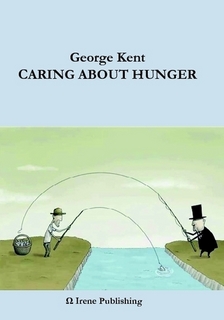Caring about Hunger
REVIEWS, 28 Nov 2016
Caring about Hunger by George Kent, Irene Publishing, October 2016, 200 pp.
 In this world of abundant resources and huge wealth, hunger cannot be understood simply as a problem of food production. It is also a matter of human relations.
In this world of abundant resources and huge wealth, hunger cannot be understood simply as a problem of food production. It is also a matter of human relations.
Hunger grows out of widespread indifference and exploitation. The goal of ending hunger has been achieved in many places, including places where people have little money.
In stable, strong communities, where people care about one another’s well-being, no one goes hungry. That caring is strengthened when people work and play together.
This insight tells us the direction we need to take to move toward a world without hunger. The problem of global hunger will be solved when we learn to live together well locally.
_______________________________________
TRANSCEND member George Kent is Professor of Political Science (Emeritus) at the University of Hawai‘i, U.S.A. He currently teaches an online course on the Human Right to Adequate Food at the Centre for Peace and Conflict Studies, University of Sydney, Australia, and also the Transformative Social Change concentration at Saybrook University in San Francisco. His recent books on food policy issues are Freedom from Want: The Human Right to Adequate Food, Global Obligations for the Right to Food, Ending Hunger Worldwide, and Regulating Infant Formula.
Tags: Books
DISCLAIMER: The statements, views and opinions expressed in pieces republished here are solely those of the authors and do not necessarily represent those of TMS. In accordance with title 17 U.S.C. section 107, this material is distributed without profit to those who have expressed a prior interest in receiving the included information for research and educational purposes. TMS has no affiliation whatsoever with the originator of this article nor is TMS endorsed or sponsored by the originator. “GO TO ORIGINAL” links are provided as a convenience to our readers and allow for verification of authenticity. However, as originating pages are often updated by their originating host sites, the versions posted may not match the versions our readers view when clicking the “GO TO ORIGINAL” links. This site contains copyrighted material the use of which has not always been specifically authorized by the copyright owner. We are making such material available in our efforts to advance understanding of environmental, political, human rights, economic, democracy, scientific, and social justice issues, etc. We believe this constitutes a ‘fair use’ of any such copyrighted material as provided for in section 107 of the US Copyright Law. In accordance with Title 17 U.S.C. Section 107, the material on this site is distributed without profit to those who have expressed a prior interest in receiving the included information for research and educational purposes. For more information go to: http://www.law.cornell.edu/uscode/17/107.shtml. If you wish to use copyrighted material from this site for purposes of your own that go beyond ‘fair use’, you must obtain permission from the copyright owner.